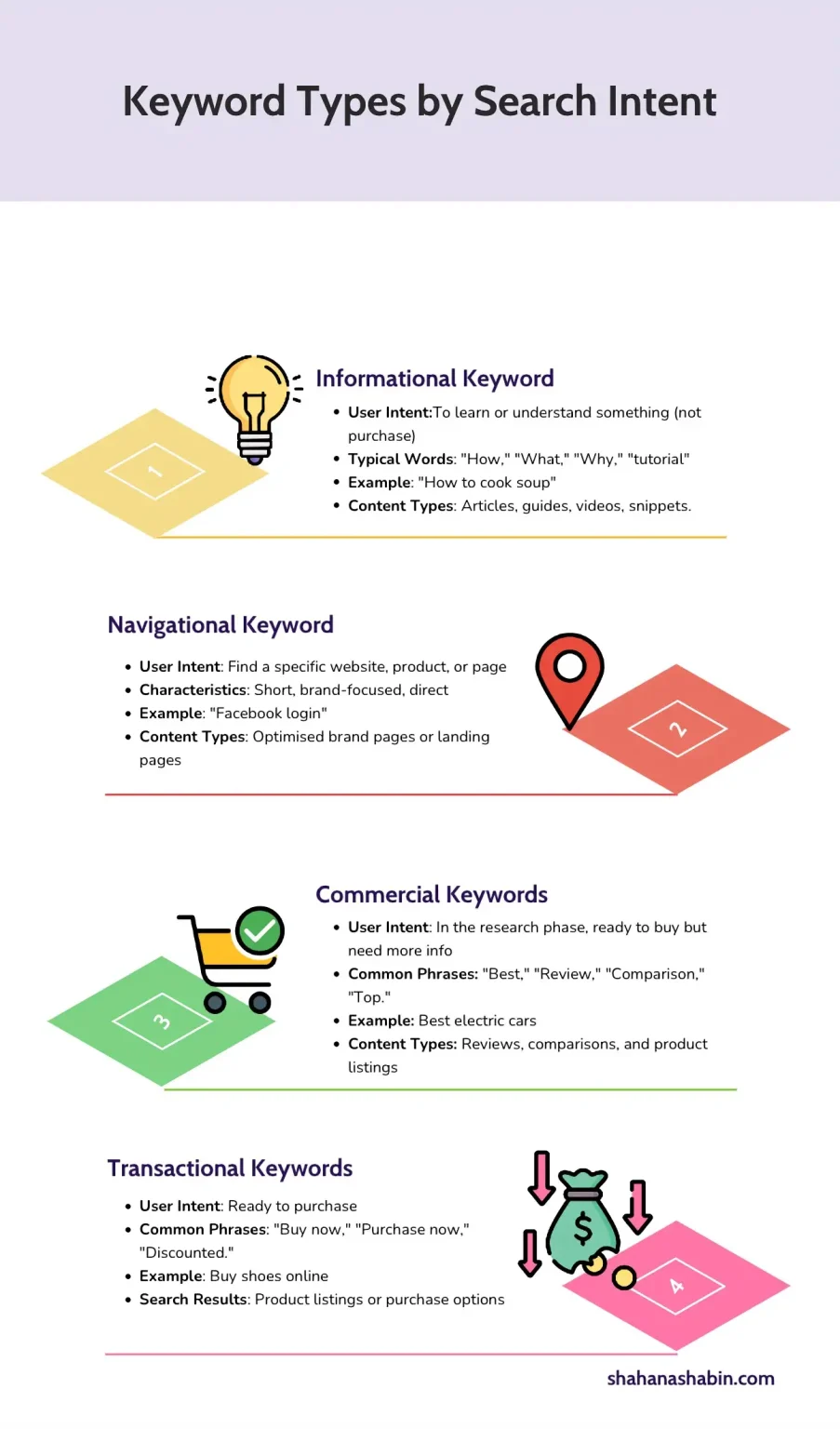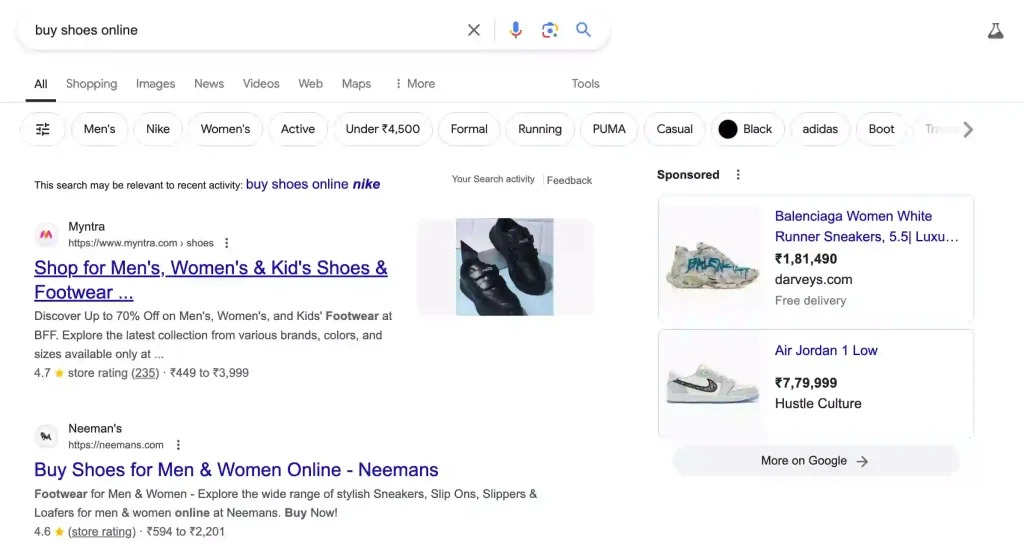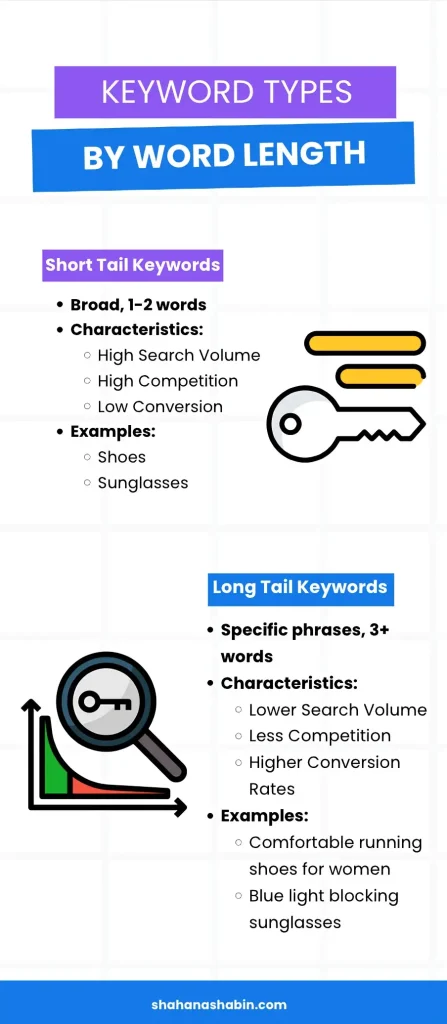8 Types of SEO Keywords You Must Know
What is a keyword
Keywords are the words or phrases people use when searching for something online.
For instance, someone looking to buy a pet training tool might type “pet training tool” into Google, Bing, or another search engine. This phrase, “pet training tool,” is called a keyword. When users enter such keywords, search engines pull up the best matches.
Keywords can be classified in various ways based on user intent, specificity, search volume, and more. Here are the most important types of keywords in SEO:
- Informational: User seeks information on a topic.
- Navigational: User looks for a specific site or page.
- Commercial: User researches products or brands before buying.
- Transactional: User is ready to purchase.
- Short-tail keywords (1-2 words): Broad, high-volume terms.
- Long-tail keywords (3+ words): Specific phrases with lower volume but higher conversion.
- Local keywords: Location-based keywords.
- Global keywords: Keywords aimed at a worldwide audience.
Keyword Types by Search Intent
Keywords can serve different purposes, depending on what the user aims to do with their search (search intent).
These search intents play a big role in how keywords are categorised. Knowledge of keyword types based on search intent allows you to better tailor your content to what people are actually searching for online.
There are mainly four types of keywords based on search intent, as shown in the infographic.

Let’s jump into each one of them in detail.
1. Informational Keywords
Informational keywords are the terms people use when they want to learn or understand something.
Such keywords usually occur at the beginning of the buying process when customers are in the research phase. At this point, they’re never in need of purchasing; they are only interested in information.
These types of keywords often start with words like “why, what, where, when, who, and how.”
For example, an informational keyword like ‘how to cook soup’ returned an article with intricate recipes.

Just like the above one, informational keyword searches generally return results like articles, videos, or guides. Many such queries also display featured snippets answering users’ queries instantly, without forcing them to click
Here are some more examples of informational keywords:
- How to cook soup
- What is meant by keywords in SEO
- Pros and cons of drinking milk every day
- How to write a research paper
- Best hiking trails
- Symptoms of flu
- Online courses for graphic design
By focusing on these types of keywords, you can create content that answers questions and builds trust with your audience. It’s all about giving them the information they need when they’re searching for it.
2. Navigational Keywords
Navigational keywords are the phrases individuals use to discover a specific website, webpage or product. These types of keywords indicate that the users are already familiar with the product or website.
For example, searching for “Facebook login” in your browser’s search box returns a specific result in the Search Engine Result Page (SERP), as shown in the image below: the Facebook login page.

In this case, “Facebook login” is a navigational keyword because the user is already aware of the destination and is simply utilising the search engine to get there.
Examples of navigational keywords include:
- Youtube
- Nike
- Adidas
In businesses, navigational keywords, which are usually short, specific, and brand-centred, are used to optimise the site to attract customers who are looking for a particular brand or a specific page. This, in turn, will bring in increased organic traffic
3. Commercial Keywords
Commercial keywords are used by consumers who are in the middle of the buying process, making them critical for businesses aiming to influence purchasing decisions.
These users are typically in the research phase, meaning they have the intent to purchase a product or service but are not ready to do so immediately.
These type of keywords often includes phrases such as “best,” “review,” “comparison,” and “top.” Here are some examples of commercial keywords:
- Best electric cars
- Review of iPhone 16
- Top marketing strategist
- Comparison between iPhone 16 and Samsung S24 Ultra
In these searches, users are almost ready to make a decision but require more detailed information about the products or services.
For example, when looking for terms like “best electric cars,” consumers are probably going to come across SERP results with reviews, comparisons, and product listings that provide the specifics they need to decide.Here’s an example of what this search result looks like

By targeting commercial keywords, you can attract users who are in the decision-making stage and provide them with the information needed to finalize their purchase.
4. Transactional Keywords
Transactional keywords refer to the specific words or phrases that customers type when they are ready to make the purchase, placing themselves at the bottom of the sales funnel. These users are the ones who are prepared to do the transaction right away.
These types of keywords usually contain expressions like ‘checkout’, ‘buy now,’ ‘purchase now,’ and even ‘discounted,’ etc.
Here are a few examples of transactional keywords:
- Buy shoes online
- Discounted laptop
- Purchase Honda cars
For example, if a user searches for “buy shoes online,” the SERP is likely to provide a product listing or a direct-purchase option, as shown in the figure below.

By focusing on these transactional keywords, you can create and optimize product listing pages, ensuring that your website appears when users are ready to buy.
Tip:
For tips on finding keywords by search intent and crafting a winning content strategy, check out: What Is Search Intent in SEO? Tools to Help Your Content Strategy.
Keyword Types by Length: Short-Tail and Long-Tail
Keywords can vary greatly in length and specificity, impacting how effectively they connect with your audience. Understanding the differences between short-tail and long-tail keywords is key to creating targeted content that meets user needs at every stage of their search.
The infographic below highlights the key differences between short-tail and long-tail keywords.

Let’s explore each type and understand their unique benefits.
What is a short tail keyword
Short-tail keywords Also called as head terms, broad keywords, or focus keywords, these usually consist of one or two words. They target a broad audience, but frequently lack the specificity required to capture intent-driven searches.
Examples of short-tail keywords include:
- Shoes
- Sunglasses
- Paper clips
- Bags
- Laptops
These keywords usually have:
- High Search Volume: Because they have general topics they attract a large number of searches.
- High competition: There are just too many sites targeting the keywords, making it quite tough to rank up in the SERPs.
- Poor Conversion Rates: Although they may create a lot of traffic, the intention behind such searches is not well defined, hence conversion rates become very poor. For example, A person searching to find “shoes” may have more interest in the process of discovering information or getting inspiration rather than making an actual purchase.
Advantages of Short-Tail Keywords
- Wider Reach: Short-tail keywords can produce quite a number of traffic since they refer to broad topics of interest.
- Brand awareness: By targeting short-tail keywords, businesses can increase visibility and brand recognition across a larger audience base. This is particularly useful for new brands looking to establish themselves in the market.
- Foundation for Content Strategy : The base for developing the required related long tail keywords can be laid with the support of short tail keywords.For instance, if “travel” is a short-tail keyword, related long-tail phrases could include “best travel destinations for families” or “how to travel on a budget.”
- Content Ideas: Short-tail keywords can inspire content creation by showing the most popular topics users are interested in, which helps keep businesses relevant in their industry.
What is a Long Tail keyword
Long-tail keywords are usually phrases with three or more words that are more specific and less competitive.
For example, “sunglasses” is a short-tail keyword, but “blue light blocking sunglasses” is more detailed, making it a long-tail keyword.
These are some other examples of a long tail keywords:
- Comfortable running shoes for women
- Best lightweight laptops for students
- Organic fair trade coffee beans
- Eco-friendly non-slip yoga mats for beginners
- Dog training equipments for small dogs
long-tail keywords can be described by the following characteristics.
- Lower Search Volume: These keywords are less likely to draw searches but otherwise more focused.
- Less Competition : For the fact that they’re specific, there aren’t that many websites competing for these terms.
- Better Conversion Rates: Generally, users searching with long-tail keywords have a more defined intent and thus are more likely to convert. For example, someone who is typing “best running shoes for women” is likely to make a purchase.
Advantages of Long-Tail Keywords
- Higher Conversion Rates: Users who type long-tail queries are closer to the conversion point in the buying process. They know what they want, and when they find the content that matches their needs, they are more likely to convert.
- Lower Competition: Long-tail keywords have fewer competitions than the short-tail keyword. This means that the lesser or newer website can rank in SERPs without the high amount of domain authority required.
- Niche Targeting: Long-tail keywords will help businesses target niche audiences. Long-tail keywords are more likely to improve user engagement and satisfaction because content is customized for specific needs.
- Cost-Effective Advertising: Long-tail keywords are generally widely used in a paid advertising campaign, because they have lower cost-per-click (CPC) since there is relatively less competition, making them the most cost-effective form of targeted traffic.
Keyword Types by Target Audience: Global and Local Keywords
When it comes to types of keywords, businesses need to know which is which in search engine optimisation (SEO) when the aim is to gain greater online visibility and relevance.
Local keywords target a specific geographic location to help businesses reach more relevant audiences. On the other hand, global keywords cast a much wider net, targeting audiences located anywhere. The distinction makes all the difference in how businesses attract customers to certain geographic locations.

Here’s a visual to help you better understand the key differences between local and global keywords.
Now, let’s dig deeper into how each type impacts SEO strategies.
Local Keywords
The use of local keywords is basically involving geographically relevant terms or phrases that may point to the particular location, such as “best pizza in New York” or “plumbers near me.” Such keywords are very important for businesses that operate within specific regions or as a way of attracting local clients. The advantages of using local keywords include:
- Increased Relevance: By targeting users in specific areas, businesses can provide more relevant content and services, improving the chances of conversion.
- Higher conversion rates: Local searches often reflect a high conversion rate since the user tends to be seeking services or products in the area.
- Competition Advantage: Many businesses overlook local SEO, creating opportunities for those who optimize for local keywords to rank higher in search results.
Global Keywords
Global keywords, however, are much broader terms that are not location-specific. For example, queries like“online shopping”or“digital marketing services.” Here is the benefit of global keywords,
- Increase Traffic: These keywords help visitors from other geo locations visit a website therefore increasing the overall traffic to a website.
- Brand Awareness: Global keywords allow you to build the name of the brand and brand authority globally.
- Wide Ranged Content Options: Content targeting general issues rather than location-specific would allow businesses to reach a larger crowd.
Conclusion
SEO is all about keywords and keywords are the backbone of your website & without them, customers will never discover your website
By understanding the nuances of types of keywords and strategically implementing them into your content, you can elevate your online presence.
Being a digital marketing strategist in Kochi, Kerala, I can help you leverage the impact of keywords to attract organic traffic, generate brand awareness, and meet your business goals.
Frequently Asked Questions (FAQs) About Using Different Types of SEO Keywords Effectively
- What are the most important keywords for my business?
Focus on understanding your audience’s search intent to determine priority keywords.
2. How often should I update my keywords?
Regular audits every few months can help keep your strategy fresh and relevant.
3. Can I use the same keywords across multiple pages?
It’s better to diversify your keywords for different pages to avoid internal competition and improve page relevance.

Great breakdown of SEO keywords! The section on long-tail keywords and their higher conversion rates really stood out. Simple yet effective insights. well done!